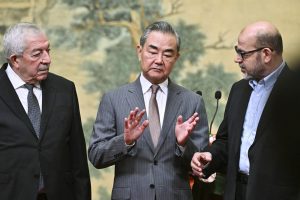The recent reconciliation talks held in Beijing mark a significant milestone in the quest for Palestinian unity. Under the auspices of the Chinese government, various Palestinian factions have agreed to form a unified front within the Palestine Liberation Organization (PLO), aiming to establish an independent Palestinian state with Jerusalem as its capital, in accordance with United Nations resolutions. This monumental agreement not only holds promise for the Palestinian people but also underscores China’s growing influence and commitment to peace in the Middle East.
For decades, the Palestinian people have endured division and conflict, with Hamas controlling the Gaza Strip and the Fatah-controlled Palestinian Authority governing part of the Israeli-occupied West Bank.
The talks in Beijing, however, paved the way for comprehensive national unity, bringing together diverse factions such as Fatah, Hamas, and the Popular Front for the Liberation of Palestine, among others. This unity is crucial for addressing the long-standing issues faced by Palestinians and for presenting a cohesive front in the struggle for independence and self-determination. It comes at a particularly critical time, as Israel’s military continues to bombard and occupy Gaza, seeking to eliminate Hamas in retaliation for the latter’s hostage-taking attack in October 2023.
China’s role in facilitating this unity agreement – known as the Beijing Declaration – cannot be overstated. China has repeatedly demonstrated its dedication to supporting the Palestinian cause, especially since the war in Gaza began. The Chinese government’s invitation to the Palestinian factions and the successful mediation of their discussions reflect China’s diplomatic prowess and its ability to foster dialogue in one of the world’s most contentious regions. By doing so, China has positioned itself as a key player in the quest for Middle Eastern peace.
The agreement reached in Beijing includes several critical points. First, it calls for the formation of a temporary national unity government which will oversee the unification of Palestinian institutions and the reconstruction of Gaza. If realized, this will set a foundation for future stability and governance. Second, a commitment to holding general elections under the supervision of the Central Election Commission is a significant step toward democratic governance and political renewal in Palestine. Lastly, the activation of a unified leadership framework for political decision-making, as agreed upon in the 2011 Palestinian National Accord, ensures that all factions will have a voice in shaping the future of Palestine.
Now the key question lies in the deal’s implementation. Past reconciliation deals between Fatah and Hamas, signed in 2011 and 2022, fell through without much impact.
Much of the international community – particularly Arab nations, China, and Russia – is likely to support this new phase of Palestinian unity. Israel, however, has already rejected the possibility of the unity government taking control of a post-conflict Gaza, as has the United States. Both Israel and the United States consider Hamas a terrorist organization. Its inclusion in the unity government proposal complicates Western recognition of any such effort.
For example, reacting to the agreement reached in Beijing, a U.S. State Department spokesperson said that “when it comes to governance of Gaza at the end of the conflict, there can’t be a role for a terrorist organization. Hamas has long been a terrorist organization… [W]e want to see the Palestinian Authority governing a unified Gaza and the West Bank. But no, we do not support a role for Hamas.”
The Beijing Declaration also calls for joint efforts to convene an international conference with the full authority to implement a two-state solution by ending the Israeli occupation, implementing relevant U.N. resolutions, and making Palestine a full member state of the United Nations. This conference, under the auspices of the United Nations, aims to replace the ineffective U.S.-led peace process with a multilateral approach that upholds justice and international law.
The Beijing Declaration also addresses the humanitarian crisis faced by Palestinians. It calls for a full ceasefire in the Gaza Strip, an end to the Israeli blockade of Gaza and the West Bank, and for the world to provide unrestricted humanitarian and medical aid. These steps are essential for alleviating the suffering of the Palestinian people. Moreover, the declaration underscores the illegality of Israeli settlements and expansionism on Palestinian land, as affirmed by the International Court of Justice and various U.N. resolutions.
China’s commitment to the Palestinian cause is a beacon of hope in a tumultuous region. The success of the Beijing talks exemplifies how diplomatic engagement and international cooperation can lead to meaningful progress. As the world watches, the implementation of the Beijing Declaration will be a litmus test for the durability of this newfound unity and the future of Palestinian statehood.
The Palestinian factions must seize this opportunity to strengthen their political and social institutions, ensuring that the dream of an independent Palestine becomes a reality. If that comes to pass, China’s role in this historic achievement will be remembered as a turning point in the Palestinian struggle for liberation, marking the beginning of a new era of peace, unity, and hope.

































